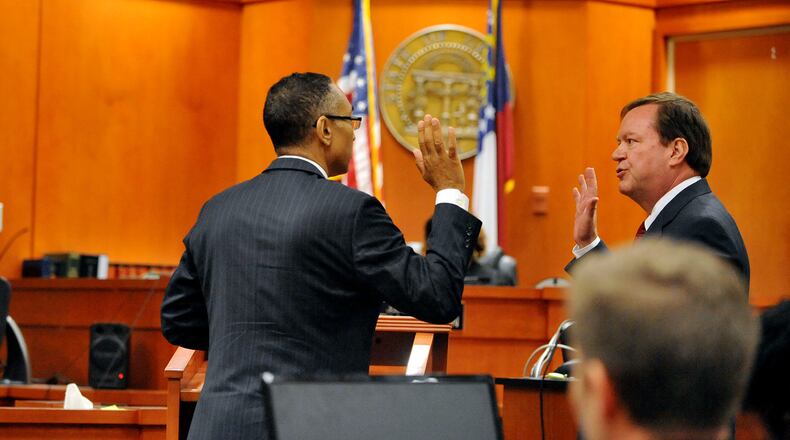The defense attorney for Burrell Ellis caught the attention of Georgia Supreme Court justices Monday as he detailed the times he believed the suspended DeKalb County CEO was treated unfairly during his corruption trial last year.
“I have never seen a greater abuse of the criminal justice system than this case,” said Craig Gillen, one of Ellis’ lawyers.
Gillen’s parting comment to the seven justices: prosecutors and the judge went so far as to admonish Ellis and his wife about “holding hands and looking at each other lovingly” during breaks in the trial because that could influence the jury. Prosecutors offered the Ellises a room in the courthouse where they could hold hands and look at each other, Gillen said.
Ellis was convicted last July and sentenced to 18 months in prison, plus 3½ months on probation, for one count of attempted extortion of a campaign contribution from a county vendor and three counts of perjury for lying to a special-purpose grand jury.
Ellis was released last March after serving eight months of that sentence, which meant he was free to be in the courtroom Monday to hear 40 minutes of argument in the appeal of his conviction.
Ellis, a real estate attorney, temporarily lost his license to practice when he was convicted last summer, but his law license could be reinstated if he wins his appeal. Ellis has not resigned as DeKalb’s chief executive officer and remains suspended without pay. He can’t be permanently removed from office until he loses his appeal; his term ends this year.
Last year was the second time prosecutors brought a case against Ellis. The first one ended in a mistrial because the jury could not reach a verdict on 13 counts of perjury and charges that he tried to shake down vendors for campaign contributions.
The second trial was much different, Gillen said.
Prosecutors only pursued nine felony counts in the second trial. Also in the second trial, Ellis’ attorneys were more limited in the topics they could broach or the witnesses they could call. Judge Courtney Johnson signed an order threatening Ellis and his lawyers with criminal contempt if they strayed beyond the parameters she laid out.
“In the first trial, the defendant and his attorney repeatedly violated the order (that limited testimony),” said Chris Timmons, who supervises the organized crime unit in the DeKalb County District Attorney’s Office. “So that led to the threat of criminal contempt (in the second trial).”
Timmons said more portions of transcripts and recordings were redacted so the second jury wouldn’t be distracted by “irrelevant” information.
“We were careful that the documents (were) redacted and the recordings were redacted to match the charges,” Timmons said.
“So you left in parts beneficial to the state but removed all that favored Ellis?” Justice David Nahmias asked.
“We got strategic in the second trial,” Timmons said. “We got smarter.”
Timmons also argued that Ellis’ appeal should have gone first to the state Court of Appeals, not the Supreme Court. But the justices wanted to know more about limits on Ellis’ defense.
“It is your contention he was so limited … he was denied a fair trial?” Justice Robert Benham asked Ellis’ attorney.
“Absolutely,” Gillen responded.
Gillen said limits Johnson put in place meant Ellis could not explain what he was thinking when he testified before a special purpose grand jury looking into allegations of corruption in the county's waste management department. He also could not testify or call vendors to make the point that there were many he did not threaten, even though they didn't give to his campaign.
Yet, Johnson allowed prosecutors to go into areas the defense was not allowed to broach, Gillen said.
“Time and time again he was denied the right to defend himself,” Gillen said. “What Mr. Ellis wanted to do was to tell his story….
“We couldn’t let the jury know what he really did, how he really dealt with vendors. He was not able to talk about the circumstances … in the grand jury. What I wanted to do was show the context. He was not allowed to say what he thought or what was going on.”
About the Author
The Latest
Featured


